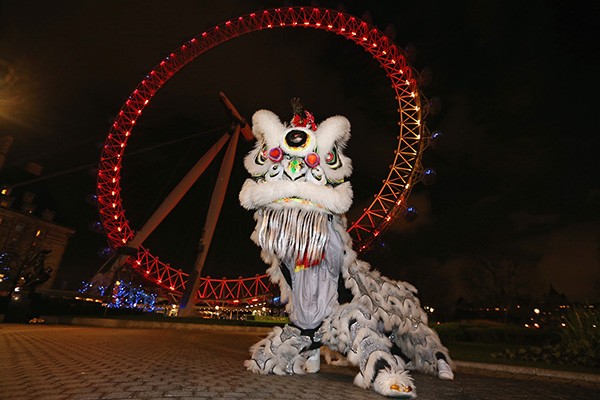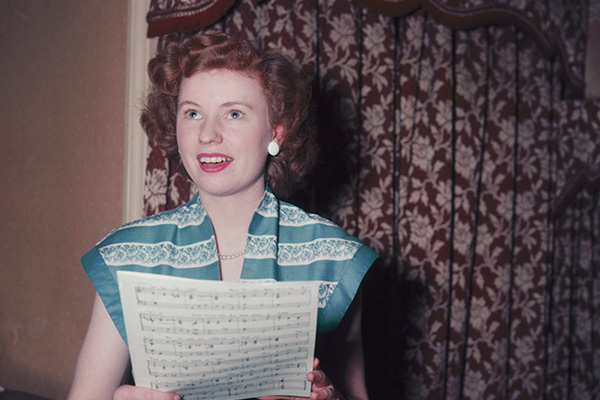2015 has been designated the International Year of Light and the International Year of Soils by the United Nations General Assembly.
Meanwhile, for the Chinese it will be the Year of the Sheep (from February 4). And as if that were not excitement enough, next year will see significant anniversaries in the world of poetry, European politics and in Loch Ness.
Songwriting will have memorable anniversaries in 2015. Pack Up Your Troubles in your Old Kit Bag, written by Welsh brothers Felix and George Powell will celebrate its 100th birthday.
In a move that could probably be classified as irony, Felix took his own life while on duty with the Home Guard - he shot himself through the heart using his own rifle. Meanwhile his brother, so disaffected with war, became a conscientious objector.
The death 300 years ago in 1715 of Nahum Tate will be commemorated by those who regard While Shepherds Watched Their Flocks by Night as much a part of Christmas as tinsel or turkey.
Tate, a Dublin man of Cavan stock, was rewarded for his efforts by being named British Poet Laureate.
 For the Chinese the new year will be the Year of the Sheep (from February 4)
For the Chinese the new year will be the Year of the Sheep (from February 4)We had to wait 270 years for another Irish Christmas song to come along. A Fairytale of New York was written exactly 30 years ago in 1985 by Shane MacGowan - who for good measure was born on Christmas Day 1957 - and banjo player Jem Finer who, like some of the very best Christmas songwriters, is Jewish.
Their tale of optimism gone to the dogs has become one of the all-time Christmas classics, with its haunting melody, its sentimentality-tinged realism, and its unbeatable sing-along chorus.
About a quarrelling pair of Irish immigrants in New York, the song is a perfect seasonal item, packed with regret, drink, optimism - and the deceit of nostalgia.
Other significant musical anniversaries include the 60th anniversary of Ruby Murray’s single Softly Softly reaching the top of the charts in Britain.
Ruby, who was born exactly 80 years ago in Belfast, was Ireland's first pop superstar, setting a record of five singles in the Top 20 simultaneously - an extraordinary feat which lasted until Madonna in the 1980s.
Ruby has one other claim to immortality that no other artist, not even Madonna, is ever likely to boast - she is the rhyming slang throughout Britain for a curry.
Fifty years ago a number of significant musical milestones took place, including Dáil Éireann paid £2,500 for a continuing interest in the copyright of A Soldier’s Song.
Almost as momentous, Ireland entered the Eurovision Song Contest for the first time.
Butch Moore sang I’m Walking The Streets In The Rain, and came a very creditable 6th.
The band Them also made strides in 1965. On the first day of that year, 50 years ago, they entered the British charts with Baby Please Don’t Go. The NME named Bobby Harrison as the band’s leader. We can only guess at the darkness of Van Morrison’s mood on reading this news, probably not a jaunty “Journalists, eh?”
 Ruby Murray, who was born exactly 80 years ago in Belfast, was Ireland's first pop superstar
Ruby Murray, who was born exactly 80 years ago in Belfast, was Ireland's first pop superstarAnd to finish with music anniversaries - in April 1975, 40 years ago, workers at a bankrupt piano factory on the Shannon Industrial Estate were offered pianos in lieu of wages.
2015 will mark several significant food anniversaries. 499 years ago in 1516 Munich passed Europe’s first law governing food and beverage. In actual fact, the law was aimed at safeguarding the quality of beers, and the ale we know and love today would probably not taste nearly so good but for this piece of legislation.
The big celebration will obviously be in 2016, but nonetheless Müncheners are expected to pay tribute to this landmark date in 2015, in some style. Our guess is that alcohol will play a part.
No regulations regarding food stopped a certain Monsieur Boulanger, exactly 250 years ago, from opening what is regarded as the world’s first restaurant.
Of course, inns and taverns had been going full throttle since antiquity - Sean’s Bar in Athlone, for instance, has records of every owner going back to 900AD, including Boy George who owned the premises briefly in the 1980s.
But inns were mainly for travellers and drinkers - locals wouldn’t even dream of having a meal out. M. Boulanger (his first name has escaped history) changed all that in 1765.
Come June 13, literati across the English-speaking world will be celebrating the 150th anniversary of the birth of William Butler Yeats in 1865, a man so steeped in poetry that even his name scans in iambic metre.
Other literary landmarks include the 150th anniversary of the publication of Alice's Adventures in Wonderland and the birth 150 years ago on July 16, 1865 of Canon James Owen Hannay.
“I was born in Belfast,” he said “and brought up to believe that, like St. Paul, I am a citizen of no mean city.”
Scottish tourism will surely find time to honour an Irish missionary in 2015. In AD 565, exactly 1,450 years ago, St Colmcille of Gartan became the first person in history to be recorded as having seen the Loch Ness Monster.
The Irish monk - one of the big hitters in the early European Christian church - was in what was not then known as Scotland when he came across locals burying a man who it appeared had been attacked by the monster.
The fearless Colmcille ordered one of his followers to swim across the loch. Nessie duly appeared but Colmcille made the sign of the cross, and the beast fled.
After that, it was easy enough for Colmcille to accomplish his other achievements - introducing hurling to the natives (it is now called shinty, and more than likely was the precursor of golf), teaching them to speak Irish (it’s now called Scottish Gaelic), founding Iona (where the Book of Kells was probably written) and basically helping to re-spread the Gospel back into Europe.
It’s generally accepted that May 28th, 585 BC - exactly 2,600 years ago - is the earliest precisely known date in history.
On that day the battle between the Lydians and Medes, in what is now modern Turkey, was suddenly called off when a solar eclipse occurred.
Both armies were too scared to carry on, and agreed to a truce. It’s not clear if the Lydians and the Medians have planned any big events to mark that auspicious date in 585.
But should they fail to deliver in significant fashion, at least there are several other anniversaries which will give us the opportunity to let our hair down – or at least nod wisely to ourselves.
2015 - A Year of Anniversaries
1215 - On August 24, Pope Innocent III declares the Magna Carta invalid. As Tony Hancock once observed, “Magna Carta - did she die in vain?” Pope Innocent III obviously thought so, and declared the Magna Carta invalid 800 years ago on August 24, plunging England into civil war.
1315 - The Isle of Man is brought under English control. King George VI visits some 620 years later in 1945, the first English monarch to make the journey across the Irish Sea since King Canute in the 11th century.
1415 - The 600th anniversary of the giving someone ‘the fingers’ gesture. The Battle of Agincourt, when Henry V of England's superior archers routed the French is believed to have developed the idea of showing two fingers to your esteemed opponent - or someone who’s just cut in on you on the motorway - that you still have two fully functioning fingers with which to pull back your bow string.
1565 - The 450th anniversary of the pencil, or at least its first documentation (presumably written in pencil, unless we’re very much mistaken). It was documented by Conrad Gesner, Swiss naturalist and bibliographer.
1665 - 350 years ago The Great Plague began in London.
1815 - An away win for a Dubliner, when the Duke of Wellington beats Napoleon at Waterloo. Contrary to popular opinion, he wasn’t a reluctant Irishman, and there is no record of him ever saying, “Just because a man was born in a stable doesn’t make him a horse.”
1915 - Death in Canterbury of Brother Walfrid Kerins, from Ballymote Co. Sligo, a Marist priest and founding father of Glasgow Celtic football club. Born in 1840, he’s buried in the Mount St. Michael Cemetery in Dumfries should you want to pay your respects.
1915 - Einstein's theory of general relativity is formulated. If ever somebody had a lot of explaining to do, it was our Albert.
1915 - The death of Jeremiah O’Donovan Rossa. Exiled in America after serving many years in British prisons, his funeral was the occasion of the graveside oration by Patrick Pearse which included the lines: “The fools!...They have left us our Fenian dead, and while Ireland holds these graves, Ireland unfree can never be at peace.”
1935 - The (probable) anniversary of the invention of the answering machine. William Muller takes the credit, although we have no idea what his voicemail message had to say. “If by any chance you’ve invented a telephone, please leave a message after the tone.”
1935 - the 80th anniversary of one of the most widely sung Irish songs of all time, Red Sails in the Sunset. The song was inspired by a scene from Portrush, on the North coast of Ireland. Songwriter Jimmy Kennedy had moved from his birthplace of Omagh to the Antrim town, and one evening watched as a Portstewart boat, The Kitty Of Coleraine (named after the local song), put out to sea. The sails of the boat were etched out in silhouette against the Inishowen Hills of Donegal.
The song, co-written with Hugh Williams, was subsequently recorded by many of the major artists of the 20th century, from Vera Lynn to Bing Crosby.
1965 - On March 27 Margaret Sweeney from Mayo married Thomas Gallagher from Meath. Their two lads, Noel and Liam, went on to found Oasis.
1940 - 75 years ago in 1940 travel permits were required by those in the Republic who wished to journey to the North of Ireland. No cheap shopping in Newry back then; not that there was anything very much in the Newry shops either.

